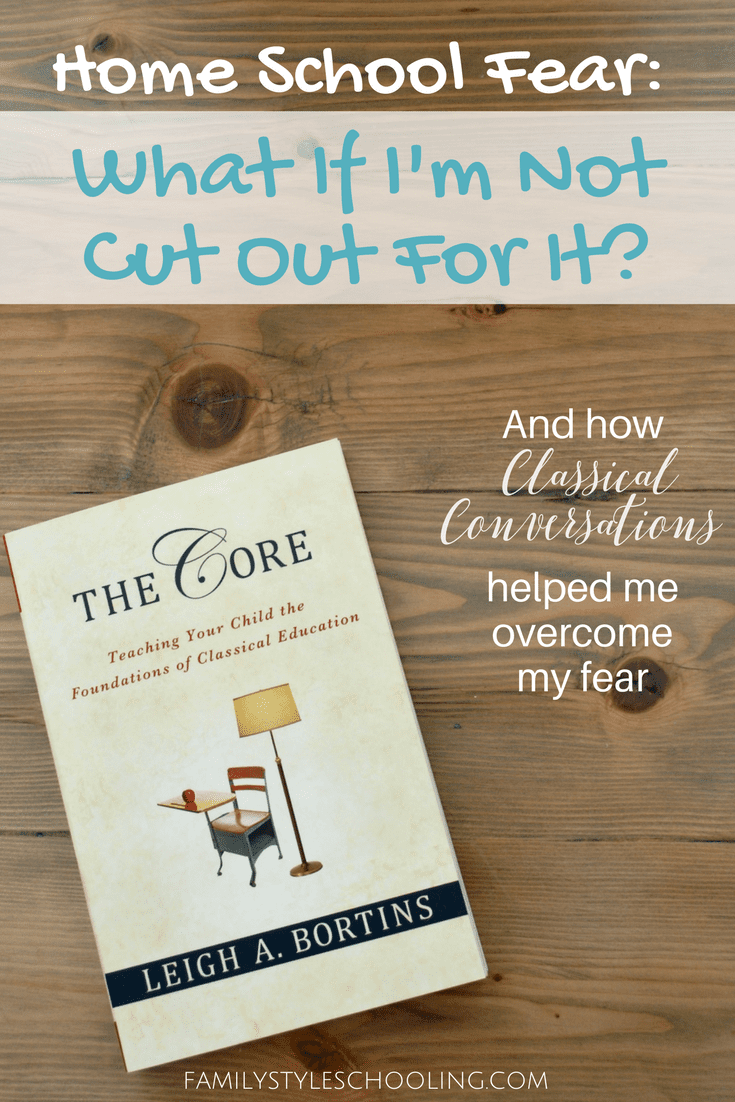Homeschool Fear: What if I’m not cut out for it?
Another common response I get when I tell someone that I home school is: “I could never have the patience for that.” When they make this statement, they're committing the fallacy of assuming. They assume that I have the patience! In their minds they see this happy little picture of my family sitting around the kitchen table smiling as we all learn together.
As great as that would be, it didn't take me long to realize that schooling my kids at home involved much more than academics. Temper tantrums, quitting, and utter frustration quickly arose—and that was just from me!
Over the past eight years I've come to realize that God has placed me in a family with certain personalities in order to make me holy not happy. When you spend 24/7 with any person, you quickly discover how selfish you really are. It happened when I got married, it happened again when I had my first baby, and it happened again when I decided to home school.
Relationships are messy, but I wouldn't trade the character training I've received from my kids for all of the hours of alone time in the world. What I have learned from Classical Conversations practicum and resources have really helped me keep my eye on the prize, which is running the race that God has set before me that includes raising my kids to know Him and make Him known.

I’m sharing some of my fears and how CC has helped me overcome them in a series on my blog. If you missed the other posts, make sure to go back and check them out.
- Fear #1: What if I forget to teach something?
- Fear #2: What if I don’t know enough?
- Fear #3: What if I’m not cut out for it?
- Fear #4: What about socialization?
- Fear #5: What if I can’t afford a private education?
Fear #3: What If I'm Not Cut Out For It?

I think what really set me against home schooling at the beginning was the idea that I just had to survive my kids until they made it to public school age, and then I could rest. That sounds horrible, but it is a popular notion of our day.
I feared bringing my kids home because I wasn't sure if I could survive them all day long. My first Classical Conversations practicum gave me a different perspective that helped me make the transition.
How CC Practicum Shaped My Soul
The shaping of a soul—that's a bold statement. But that's what happens every year for me at a CC practicum. When I first attended, I expected practical, hands-on tips and tricks to help me become a better teacher. What I left with was a banquet of teaching philosophy that would shape my thinking and in turn would shape the way I looked at my kids, responded to my kids, and interacted with my kids. In essence, my soul was softened towards my children.
That might sound a little crazy, but let me break it down for you and give you some examples.
My first year homeschooling without CC was filled with quite a few wars between me and my son—primarily in the realm of writing. His assignment was to pretend he was a reporter and write a newspaper article about the U.S. Gold Rush. It seemed like a fun assignment, and something he would enjoy doing.
He didn't enjoy it. He wouldn't even attempt it. Mom/teacher failure.
Did I show him grace and walk him through the challenging assignment with patience and kindness? No, of course not. Instead, I pulled out my stern face, offered him some motivational words, and left him to work it out on his own. The result: tears, anger, and frustration for both of us.
I felt like a failure both as a teacher and a mother, and he felt the same shortcomings as a student and a son. This is not how it should be.
As I listened at the practicum to the basics of the Classical method of teaching, I realized where I had gone wrong. In his nine years of life, my son had never read a newspaper or been a reporter. He barely even knew those things existed. He'd heard of the gold rush, but that was about it. I'd sent him out to be rhetorical on a subject of which he didn't even know the basic grammar.
Understanding the Purpose of the Classical Model
A light bulb went off in my head: if I back off and just focus on the grammar of the subject, we can both learn together, and I'm not just talking about head knowledge. The philosophy of teaching that I gleaned at the practicum was so helpful that it enabled me to become a better teacher and mother of my children. I'm still working on it, but I'm resting in God's grace to carry me in my weakness.
After eight years of working together, my son has become an excellent writer. We worked through the basics of writing, struggled through the awkwardness of thinking for himself, and celebrated the joys of confidently writing an amazing essay for his Challenge II blue book exam.
The Classical model and Classical Conversations gave me a vision for how to cultivate my children's souls in a way that nurtured truth, goodness, and beauty. In laying out a banquet for my children, my patience improved, my frustrations subsided, and my helplessness ceased. My focus was pointed towards the Lord, the only one who could truly supply all that I needed for life and godliness.
CC Resources That Have Shaped My Thinking
Each year after practicum, I return with a cart load of books, and an even longer wishlist. As I've made my way through some of the recommended readings, I've continued to deepen my understanding of the Classical model as well as gained practical advice for making it through the day-to-day life of a home schooling mom.
- The Core by Leigh Bortins - A must read for anyone starting in the Classical Conversations programs. Leigh Bortins articulated my discontent about the public school system in ways that I couldn't. Then she goes through each subject and gives practical ideas for each age group as they grow through the years. This was extremely helpful for me!
- Simply Classical by Cheryl Swope - This is a beautiful book for anyone who has any children that struggle with learning. Cheryl Swope shares the story of classically educating her two adopted children who were severely mentally handicapped. It is a beautiful testimony of the power of the classical model for any and every student.
- Mere Motherhood by Cindy Rollins - If you're feeling sunk as a mother, trapped in the daily grind of home schooling, this book will lift your spirits, make you laugh so hard your sides ache, and inspire you to continue the amazing job that you're fulfilling right now. Cindy Rollins introduced me to Morning Time, the idea of liturgy within your home school, and it has provided many of our family's best learning memories.
- Total Truth by Nancy Pearcy - This book was a game changer for me. Nancy Pearcy opened my eyes to the concept of a Biblical worldview and how easily we can get swept away from Truth in our current culture.
- Saving Leonardo by Nancy Pearcy - This book is the sequel to Total Truth, and it takes the Biblical worldview thinking to a deeper level of understanding. She shows how the philosophies of the day are expressed by the artists of the day. It's an outstanding read to continue cultivating a keen eye for identifying the messages hidden within every media source today.
- Climbing Parnassus by Tracey Lee Simmons - This book is a challenge to read, but it was well worth the effort. When I first started with Classical Conversations, I wasn't so sure about studying Latin. Tracey Lee Simmons makes a fantastic argument for the study of both Greek and Latin in this book, and it really made me excited about tackling a dead language.
- Everyday Talk: Talking Freely and Naturally about God with Your Children by John Younts - One of the best ways Classical Conversations has equipped me as a parent is encouraging me to continue having conversations with my children. We have such wonderful discussions about themes in the literature we are reading, issues in current events, and philosophies in the movies we watch and what God's Word has to say about them. This book is a great encouragement to continue to cultivate those types of conversations.
- Abolition of Man by C.S. Lewis - Another challenging read, but rewarding in every way. Lewis challenges the modern idea of teaching students relativism, and argues for training students with objective values. It's a worthy pursuit to read.
- Norms and Nobility by David Hicks - Another worthy pursuit (of which I've only made it through the first three chapters) is Norms and Nobility. Hicks offers his critique on modern education and backs it up with a solution: Classical education. He walks his readers through the values and philosophy of classical education, and then offers practical ideas for how to implement this type of education today.
Truth: If God Called You To It, He'll Equip You
The truth is that you can't home school on your own. If God has called you to it, He will equip you for it. My CC community has been such a great support in this arena as well. As I struggle through having patience in a certain area of teaching, I generally have a friend to help me see the truth in the situation. Iron sharpening iron. It's really effective.
Make sure to check back as I finish out my series on home schooling fears:
- Fear #1: What if I forget to teach something?
- Fear #2: What if I don’t know enough?
- Fear #3: What if I’m not cut out for it?
- Fear #4: What about socialization?
- Fear #5: What if I can’t afford a private education?
Betsy Strauss is an unexpected homeschooler, mother of three, who is in a relationship with a sweet man for life. She loves reading books, drinking coffee, and learning anything with her kids.

